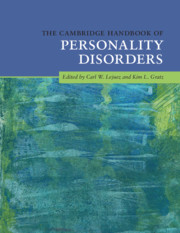Book contents
- The Cambridge Handbook of Personality Disorders
- The Cambridge Handbook of Personality Disorders
- Copyright page
- Contents
- Figures
- Tables
- Contributors
- Preface
- Part I Etiology
- Part II Models
- Part III Individual Disorders and Clusters
- 9 Cluster A Personality Disorders
- 9a Conceptual and Methodological Reflections on Schizotypy, Schizotypic Psychopathology, Cluster A Disorders, and Schizophrenia: Commentary on Cluster A Personality Disorders
- 9b Improved Operationalization and Measurement Are Central to the Future of Cluster A Personality Disorders: Commentary on Cluster A Personality Disorders
- 9c Cluster A Heterogeneity: Author Rejoinder to Commentaries on Cluster A Personality Disorders
- 10 Borderline Personality Disorder
- 10a Further Reflections on Assessment, Etiology, and Treatment: Commentary on Borderline Personality Disorder
- 10b Integrating Neuroscience and Psychotherapy: Commentary on Borderline Personality Disorder
- 10c The Promise of Applying a Developmental Psychopathology Framework to the Etiology and Treatment of Borderline Personality Disorder: Author Rejoinder to Commentaries on Borderline Personality Disorder
- 11 An Integrative Biobehavioral Trait Perspective on Antisocial Personality Disorder and Psychopathy
- 11a What Do We Talk about When We Talk about Psychopathy? Commentary on an Integrative Biobehavioral Trait Perspective on Antisocial Personality Disorder and Psychopathy
- 11b Issues of Emphasis in the Triarchic Psychopathy Model: Commentary on an Integrative Biobehavioral Trait Perspective on Antisocial Personality Disorder and Psychopathy
- 11c An Agreeable Response to Questions and Criticisms: Author Rejoinder to Commentaries on an Integrative Biobehavioral Trait Perspective on Antisocial Personality Disorder and Psychopathy
- 12 Narcissistic and Histrionic Personality Disorders
- 12a A Call for Scientific Caution: Commentary on Narcissistic and Histrionic Personality Disorders
- 12b Beyond Nucleus Diagnostic Conceptualizations: Commentary on Narcissistic and Histrionic Personality Disorders
- 12c Clinical Personality Science of Narcissism Should Include the Clinic: Author Rejoinder to Commentaries on Narcissistic and Histrionic Personality Disorders
- 13 Cluster C Anxious-Fearful Personality Pathology and Avoidance
- 13a Epidemiological, Factor-Analytic, and Cognitive Factors in the Position of Obsessive-Compulsive Personality Disorder among the Cluster C Personality Disorders: Commentary on Cluster C Anxious-Fearful Personality Pathology and Avoidance
- 13b Examining Cluster C Personality Pathology Using an Interpersonal Lens: Commentary on Cluster C Anxious-Fearful Personality Pathology and Avoidance
- 13c Processes, Mechanisms, and Progress: Author Rejoinder to Commentaries on Cluster C Anxious-Fearful Personality Pathology and Avoidance
- Part IV Assessment
- Part V Treatment
- Index
- References
11c - An Agreeable Response to Questions and Criticisms: Author Rejoinder to Commentaries on an Integrative Biobehavioral Trait Perspective on Antisocial Personality Disorder and Psychopathy
from Part III - Individual Disorders and Clusters
Published online by Cambridge University Press: 24 February 2020
- The Cambridge Handbook of Personality Disorders
- The Cambridge Handbook of Personality Disorders
- Copyright page
- Contents
- Figures
- Tables
- Contributors
- Preface
- Part I Etiology
- Part II Models
- Part III Individual Disorders and Clusters
- 9 Cluster A Personality Disorders
- 9a Conceptual and Methodological Reflections on Schizotypy, Schizotypic Psychopathology, Cluster A Disorders, and Schizophrenia: Commentary on Cluster A Personality Disorders
- 9b Improved Operationalization and Measurement Are Central to the Future of Cluster A Personality Disorders: Commentary on Cluster A Personality Disorders
- 9c Cluster A Heterogeneity: Author Rejoinder to Commentaries on Cluster A Personality Disorders
- 10 Borderline Personality Disorder
- 10a Further Reflections on Assessment, Etiology, and Treatment: Commentary on Borderline Personality Disorder
- 10b Integrating Neuroscience and Psychotherapy: Commentary on Borderline Personality Disorder
- 10c The Promise of Applying a Developmental Psychopathology Framework to the Etiology and Treatment of Borderline Personality Disorder: Author Rejoinder to Commentaries on Borderline Personality Disorder
- 11 An Integrative Biobehavioral Trait Perspective on Antisocial Personality Disorder and Psychopathy
- 11a What Do We Talk about When We Talk about Psychopathy? Commentary on an Integrative Biobehavioral Trait Perspective on Antisocial Personality Disorder and Psychopathy
- 11b Issues of Emphasis in the Triarchic Psychopathy Model: Commentary on an Integrative Biobehavioral Trait Perspective on Antisocial Personality Disorder and Psychopathy
- 11c An Agreeable Response to Questions and Criticisms: Author Rejoinder to Commentaries on an Integrative Biobehavioral Trait Perspective on Antisocial Personality Disorder and Psychopathy
- 12 Narcissistic and Histrionic Personality Disorders
- 12a A Call for Scientific Caution: Commentary on Narcissistic and Histrionic Personality Disorders
- 12b Beyond Nucleus Diagnostic Conceptualizations: Commentary on Narcissistic and Histrionic Personality Disorders
- 12c Clinical Personality Science of Narcissism Should Include the Clinic: Author Rejoinder to Commentaries on Narcissistic and Histrionic Personality Disorders
- 13 Cluster C Anxious-Fearful Personality Pathology and Avoidance
- 13a Epidemiological, Factor-Analytic, and Cognitive Factors in the Position of Obsessive-Compulsive Personality Disorder among the Cluster C Personality Disorders: Commentary on Cluster C Anxious-Fearful Personality Pathology and Avoidance
- 13b Examining Cluster C Personality Pathology Using an Interpersonal Lens: Commentary on Cluster C Anxious-Fearful Personality Pathology and Avoidance
- 13c Processes, Mechanisms, and Progress: Author Rejoinder to Commentaries on Cluster C Anxious-Fearful Personality Pathology and Avoidance
- Part IV Assessment
- Part V Treatment
- Index
- References
Summary
In addressing questions posed by Marcus and Nagel, the authors call attention to the variegated nature of psychopathy, highlighting its symptom subdimensions and differing manifest expressions (variants/subtypes). They discuss how the constructs of the triarchic model can be viewed both as phenotypic characteristics and as biobehavioral dispositions, and consider how these alternative perspectives can be helpful for clarifying what psychopathy “is” and “how” it develops. In responding to Lynam, they consider the sources of his criticisms as well as their content – focusing in particular on his preference for the five-factor trait model (FFM) as a descriptive framework, and the priority he places on psychopathy in its aggressive-criminal form. The authors discuss how the triarchic model complements the FFM descriptive approach through its emphasis on biobehavioral systems/processes and its ability to account for other variants of psychopathy.
Keywords
- Type
- Chapter
- Information
- The Cambridge Handbook of Personality Disorders , pp. 274 - 276Publisher: Cambridge University PressPrint publication year: 2020



